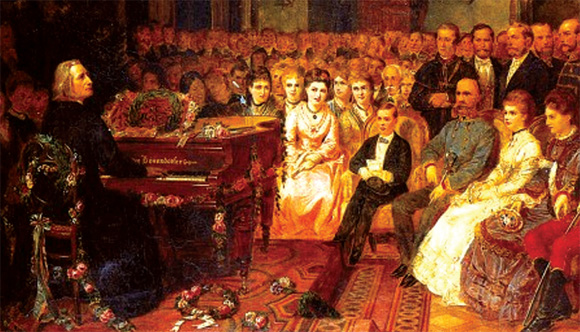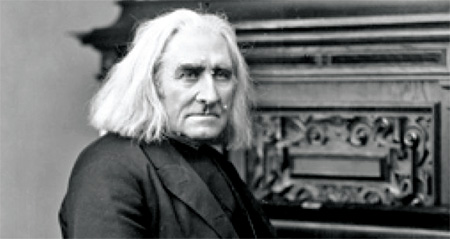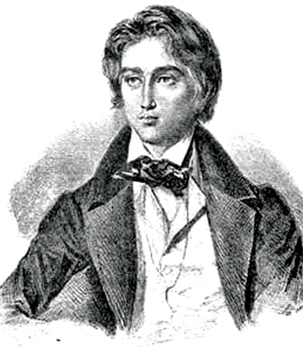Franz Liszt: combined a fierce and creative fire
Franz Liszt (1811-1886) was a major figure in the19th-century music,
an innovator in the way he combined a fierce and unquenchable creative
fire with a fully developed connoisseur's appreciation of the music of
contemporary composers and of giant figures from the past.
 The
only child of Adam and Anna Liszt, Franz was born in Raiding, Hungary.
The small town came under the administration of the Esterházy family who
employed Adam as a steward. Franz showed musical promise early,
beginning lessons with his father before he was six; by the age of seven
he was writing music. Three years later the boy was ready to make his
concert debut in the nearby town of Sopron. The
only child of Adam and Anna Liszt, Franz was born in Raiding, Hungary.
The small town came under the administration of the Esterházy family who
employed Adam as a steward. Franz showed musical promise early,
beginning lessons with his father before he was six; by the age of seven
he was writing music. Three years later the boy was ready to make his
concert debut in the nearby town of Sopron.
This was followed by two more concerts performed before the cream of
Austrian society. As a direct result, young Franz was given an annual
stipend for six years to enable him to concentrate solely on a musical
career. His father secured Karl Czerny, an ex-pupil of Ludwig van
Beethoven, as Franz's piano teacher, while Antonio Salieri taught him
theory. As both Czerny and Salieri lived in Vienna, the family moved
there in 1821.
During his time in Vienna Liszt had the good fortune to meet
Beethoven, who although profoundly deaf, attended one of his concerts
and bestowed his blessing on the boy.
Franz's reputation spread quickly, and before the end of 1821 he had
been chosen as one of the 50 composers (others included Beethoven,
Czerny and Salieri) to write a set of variations to a waltz written by
the composer/publisher Diabelli. By the autumn of 1823 Franz's father
decided it was time to widen his son's audience and moved the family to
Paris. Liszt took the Parisians by storm. He also completed his musical
education by taking private lessons from Anton Reicha and Ferdinando
Paer.
A visit to London in 1824 was a triumph, crowned by a private concert
before George IV. By late 1825 Franz had even composed a one-act opera,
Don Sanche, which was premiered in Paris to a mixed reaction. The next
two years brought constant travel through much of Europe, financial
rewards and the premieres of a stream of juvenile works, a few of which
have survived in their original form. By the summer of 1827 Franz, still
only 16, was exhausted and took to his bed in Paris.
 |
|
Franz Liszt |
Doctors recommended a cure at the baths in Boulogne, to which both
father and son returned. Shortly after their arrival, Franz's father,
aged 51, died from typhoid.
The death of his father forced Liszt to re-evaluate his career
choices. Already deeply disaffected with the life of a touring virtuoso,
he found the prospect of prolonging it repugnant.
For him, music was a noble calling; being “a musician in the employ
of the rich, who patronized me and paid me like an itinerant
entertainer” he felt to be degrading.
Arranging for his mother to join him in Paris, he earned a living by
teaching piano to the children of the rich and influential, falling
deeply in love with the 16-year-old daughter of a cabinet minister.
Though his feelings were reciprocated, her father objected and the girt
was quickly married off to a socially acceptable suitor.
Liszt never forgot her, even making provision for her in his will.
For several years he withdrew from the world and even considered
entering a seminary. He had lost the way forward. It took the 1830
revolution in France to present him with a solution.
For a young man with a passionate commitment to social equality and
democracy, the overthrow of an autocratic monarch was profoundly
inspiring: he immediately planned a Revolutionary symphony to express
his sentiments and although he never progressed very far with the idea,
it had the effect of bringing him out into the world again.
 |
|
Young Franz Liszt |
A series of musical events in 1830-31 cemented his renewed ties with
humanity and confirmed the form his artistic voice would take.
Attending the first performance of Hector Berlioz's Symphonie
fantastique, Liszt was overwhelmed by the vivid expression of such
turbulent ideas and emotions.
He applauded wildly according to Berlioz, dragging him off “for
dinner at his house and overwhelming me with his enthusiasm”.
The two became friends, Liszt learning a great deal from Berlioz
about scoring for an orchestra.
Three months later he was in the audience at Niccolò Paganini's Paris
début.
Again he was overwhelmed, this time by the sheer demonic pitch of
Paganini's virtuosity, and his charismatic presence. Soon after the
concert, he began work on the first Étude d'exécution transcendante
d'après Paganini, works long regarded as a set of impossibly difficult
piano pieces.
At the end of 1831 Frédéric Chopin (then 21) arrived in Paris and
held his first concert. Liszt was again present and true to his open
nature immediately declared his belief in Chopin's genius, a belief that
was never shaken.
All the composers helped define the approach Liszt took towards his
own compositional wizardry and helped him to mould his talents until his
audiences became as possessed by his music as himself.
But it required one more event to put all the encounters into
perspective: in 1833 Liszt, still only 22, fell in love with Countess
Marie d'Agoult, a married woman of 28.
- Internet |

